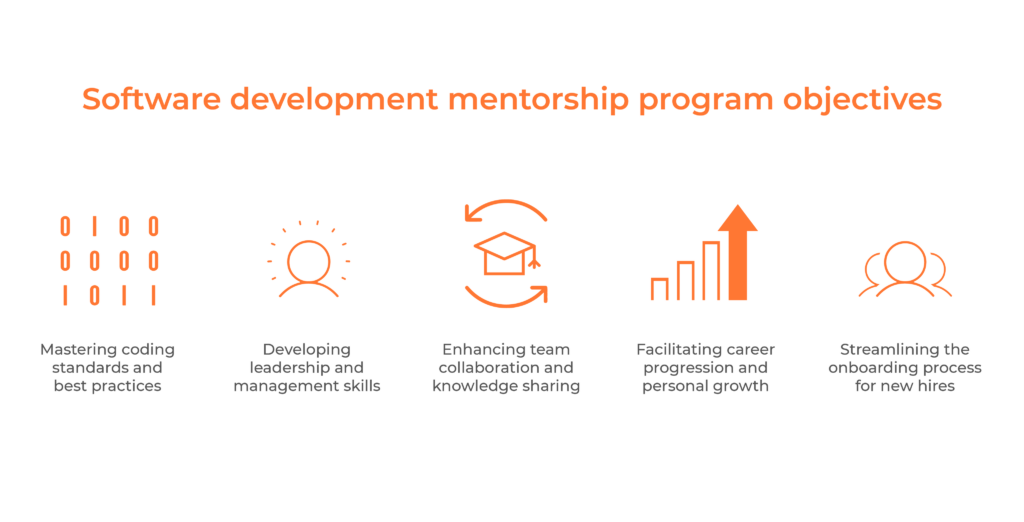Coaching and mentoring are often used interchangeably in professional development conversations, but they serve distinctly different purposes in the IT workplace.
Coaching typically focuses on developing specific skills and achieving concrete goals through structured training approaches. Coaches don’t necessarily need industry experience to be effective in many fields.
Mentoring, by contrast, is a relationship-based guidance system where someone with relevant life and professional experience supports a mentee’s overall career development. Rather than pursuing specific metrics, mentorship guides professionals toward broader growth and long-term success.
This article explains why mentoring often works better in IT environments, and how it helps address the specific challenges tech teams face today.
Why technical teams resist traditional coaching
The IT industry presents a unique challenge for traditional coaching methods. Developers and technical professionals typically only respect and listen to individuals who possess genuine technical backgrounds and real IT experience. This creates a significant barrier for coaches who lack this specialized knowledge.
When coaches without technical credentials attempt to guide IT teams, they often struggle to establish credibility and rapport. Technical professionals value practical experience over theoretical knowledge, making it difficult for non-technical coaches to create meaningful connections or deliver advice that resonates with development teams.
Mental health crisis in tech
Millennials and Gen Z professionals, who now dominate IT departments, experience disproportionately high levels of stress, anxiety, and burnout in their daily work. According to Forbes, fewer than six in ten of these younger tech workers feel comfortable discussing mental health challenges openly with their managers.
Even more concerning, just over half believe their managers would know how to help if they shared their mental health struggles. This creates a significant gap in support systems for younger tech workers, highlighting the need for more empathetic and relationship-focused guidance approaches in IT environments.
Evolution of performance management in IT
Traditional coaching in IT typically emerges when multiple developers or managers need to develop similar skills simultaneously. Common scenarios include implementing new systems or processes, where structured training and measurable goals make sense.
However, what was once called coaching has evolved into Performance Management in modern IT teams. Today’s mentors increasingly leverage software solutions to track developer performance metrics.
With advanced tools and AI assistance, the rigid structures of traditional coaching have become less necessary, as mentors can now fulfill both the supportive relationship role and the performance tracking function.
Why mentorship creates stronger technical leaders
Technical leads and senior developers require leadership abilities as a primary soft skill, yet leadership cannot be developed through structured training programs alone. Mentorship provides the nuanced, experience-based guidance needed to cultivate these essential leadership capabilities.
Mentoring offers a softer, more relationship-focused form of development that allows emerging leaders to learn through observation, guided practice, and personalized feedback. This approach creates space for the contextual learning and emotional intelligence development that technical leadership demands.
Implementing effective mentorship programs
The value of mentorship programs is increasingly recognized across leading organizations. According to the same Forbes research, the top 50 companies in the USA have already implemented mentorship programs, with 100% of them acknowledging their significant value.
This trend continues to grow, with approximately 70% of companies in the Top 500 list now running formal mentorship initiatives.
These successful programs share common elements: they pair mentees with mentors who have relevant technical experience, establish clear but flexible development paths, and create psychologically safe environments where both technical and emotional challenges can be discussed openly.

How AI complements mentoring
While AI and software solutions have transformed many aspects of IT work, they complement rather than replace the human connection of mentorship. Modern mentoring relationships leverage technology to enhance communication, track progress, and provide learning resources, but the core human relationship remains irreplaceable.
The rise of AI has actually increased the value of mentorship by automating routine aspects of performance management, allowing mentors to focus more on relationship-building and nuanced career guidance. This technological advancement supports rather than diminishes the mentoring experience in IT environments.
Conclusion
Effective mentorship shows measurable benefits for both individuals and organizations. IT professionals engaged in mentorship programs typically experience accelerated career growth, enhanced leadership capabilities, increased job satisfaction, and improved mental health.
For organizations, these programs result in higher retention rates, stronger internal leadership pipelines, improved knowledge transfer, and more cohesive team cultures. The investment in mentorship consistently delivers significant returns through reduced turnover costs and increased productivity.
FAQ
How can external competence review mitigate the distrust between management an What specific skills can a mentor provide that a coach cannot in the IT industry?d TL positions in IT projects?
How do mentorship programs address mental health challenges better than coaching?
What are the long-term benefits of mentoring for IT professionals?
Chapters
- Why technical teams resist traditional coaching
- Mental health crisis in tech
- Evolution of performance management in IT
- Why mentorship creates stronger technical leaders
- Implementing effective mentorship programs
- How AI complements mentoring
- Conclusion
- FAQ



